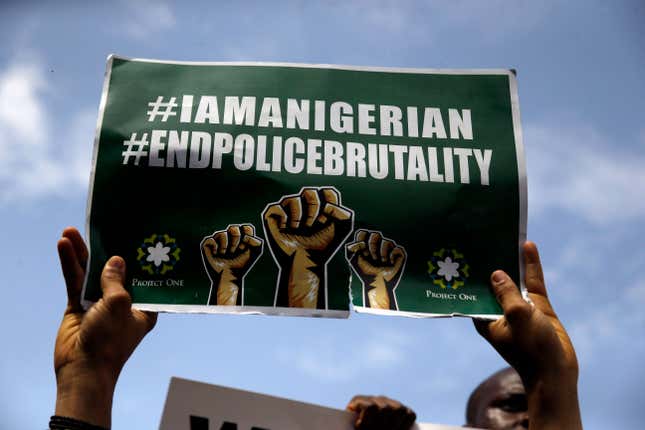
The Nigerian military has issued a warning to the public amid weeks of anti-police brutality protests, calling on “subversive elements and troublemakers to desist.” While protesters have actually been the target of violence this week as they continue demonstrations against the country’s Special Anti-Robbery Squad (SARS), the warning from an army spokesman has been widely viewed by activists as a threat against them.
“The Nigerian army (NA) wishes to reassure law abiding citizens that it is highly committed to the sustenance of peace, security and defence of democracy in Nigeria,” Nigerian army spokesman Col. Sagir Musa said in a Facebook post (h/t BBC). “The NA hereby warns all subversive elements and trouble makers to desist from such acts as it remains highly committed to defend the country and her democracy at all cost.”
Musa also said the military was ready to “fully support the civil authority in whatever capacity to maintain law and order and deal with any situation decisively,” adding that army officers have been trained “never to be distracted by anti democratic forces and agents of disunity.”
The warning came as the government banned protests in the capital city, Abuja, claiming the demonstrations were violating safety protocols to control the spread of COVID-19. There’s reason to question the government’s stated rationale, however: In the United States, researchers found that months of anti-police brutality protests have not led to upticks in COVID-19 cases.
The fight against police brutality in Nigeria bears many similarities to the Black Lives Matter demonstrations in the U.S. this year. Earlier this month, young Nigerians took to the streets to call for the government to disband SARS, a policing unit accused of extrajudicial killings, extortion and the torture of young Nigerians. Across the world, members of the diaspora, alongside human rights activists, amplified their calls—sharing anecdotes about coercion, sexual harassment, wrongful detainment and “disappeared” relatives with the hashtag #EndSARS.
Following the sustained protests and international attention, Nigeria’s chief of police announced this week that the unit would be immediately disbanded but replaced by a new group, the Special Weapons and Tactics (SWAT) team. While President Muhammadu Buhari has promised an “extensive” reform of Nigeria’s police, activists have not been satisfied by the proposed changes, and have continued to rally for more substantive policing reforms.
The demonstrations have at times turned bloody, with protesters bearing the brunt of the violence from police and other attackers. The BBC reports that demonstrators in Abuja were attacked by an unidentified group of assailants with machetes on Wednesday. There were similar reports of men with machetes showing up to the #EndSars protests in Lagos.
On Friday, Fulani Kwajafa, who founded the SARS unit, disavowed the group.
“Sars of today is not the same Sars I established in 1984,” Kwajafa told the BBC, adding that he felt “sad” and “guilty” over what the unit had become.
“I always tell my wife that I was sad [that] what I created with good purpose and direction has been turned into banditry,” Kwajafa continued. He said he supported the dissolution of SARS “100 percent.”

